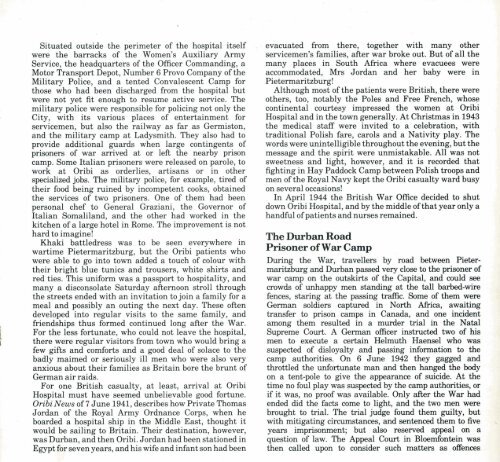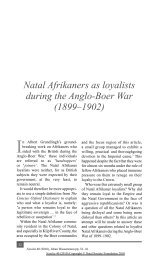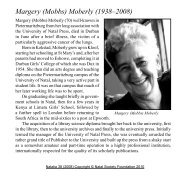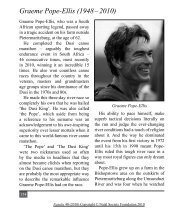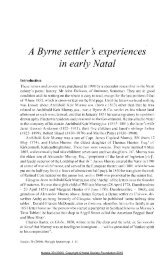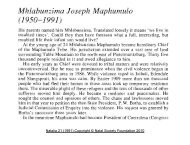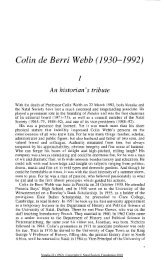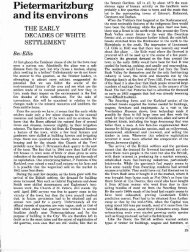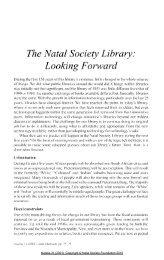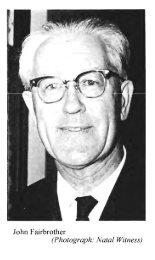John Deane - Pietermaritzburg Local History
John Deane - Pietermaritzburg Local History
John Deane - Pietermaritzburg Local History
Create successful ePaper yourself
Turn your PDF publications into a flip-book with our unique Google optimized e-Paper software.
Situated outside the. perimeter of the hospital itselfwere the barracks of the Women's Auxiliary ArmyService, the headquarters of the Officer Commanding, aMotor Transport Depot, Number 6 Provo Company of theMilitary Police, and a tented Convalescent Camp forthose who had been discharged from the hospital butwere not yet fit enough to resume active service. Themilitary police were responsible for policing not only theCity, with its various places of entertainment forservicemen, but also the railway as far as Germiston,and the military camp at Ladysmith. They also had toprovide additional guards when large contingents ofprisoners of war arrived at or left the nearby prisoncamp. Some Italian prisoners were released on parole, towork at Oribi as orderlies, artisans or in otherspecialized jobs. The military police, for example, tired oftheir food being ruined by incompetent cooks, obtainedthe services of two prisoners. One of them had beenpersonal chef to General Graziani, the Governor ofItalian Somaliland, and the other had worked in thekitchen of a large hotel in Rome. The improvement is nothard to imagine!Khaki battledress was to be seen everywhere inwartime <strong>Pietermaritzburg</strong>, but the Oribi patients whowere able to go into town added a touch of colour withtheir bright blue tunics and trousers, white shirts andred ties. This uniform was a passport to hospitality, andmany a disconsolate Saturday afternoon stroll throughthe streets ended with an invitation to join a family for ameal and possibly an outing the next day. These oftendeveloped into regular visits to the same family, andfriendships thus formed continued long after the War.For the less fortunate, who could not leave the hospital,there were regular visitors from town who would bring afew gifts and comforts and a good deal of solace to thebadly maimed or seriously ill men who were also veryanxious about their families as Britain bore the brunt ofGerman air raids.For one British casualty, at least, arrival at OribiHospital must have seemed unbelievable good fortune.Oribi News of 7 June 1941, describes how Private ThomasJordan of the Royal Army Ordnance Corps, when heboarded a hospital ship in the Middle East, thought itwould be sailing to Britain. Their destination, however,was Durban, and then Oribi. Jordan had been stationed inEgypt for seven years, and his wife and infant son had been8evacuated from there, together with many otherservicemen's families, after war broke out. But of all themany places in South Africa where evacuees wereaccommodated, Mrs Jordan and her baby were in<strong>Pietermaritzburg</strong>!Although most of the patients were British, there wereothers, too, notably the Poles and Free French, whosecontinental courtesy impressed the women at OribiHospital and in the town generally. At Christmas in 1943the medical staff were invited to a celebration, withtraditional Polish fare, carols and a Nativity play. Thewords were unintelligible throughout the evening, but themessage and the spirit were unmistakable. All was notsweetness and light, however, and it is recorded thatfighting in Hay Paddock Camp between Polish troops andmen of the Royal Navy kept the Oribi casualty ward busyon several occasions!In April 1944 the British War Office decided to shutdown Oribi Hospital, and by the middle of that year only ahandful of patients and nurses remained.The Durban RoadPrisoner of War CampDuring the War, travellers by road between <strong>Pietermaritzburg</strong>and Durban passed very close to the prisoner ofwar camp on the outskirts of the Capital, and could seecrowds of unhappy men standing at the tall barbed-wirefences, staring at the passing traEic. Some of them wereGerman soldiers captured in North Africa, awaitingtransfer to prison camps in Canada, and one incidentamong them resulted in a murder trial in the NatalSupreme Court. A German officer instructed two of hismen to execute a certain Helmuth Haensel who wassuspected of disloyalty and passing information to thecamp authorities. On 6 June 1942 they gagged andthrottled the unfortunate man and then hanged the bodyon a tentrpole to give the appearance of suicide. At thetime no foul play was suspected by the camp authorities, orif it was, no proof was available. Only after the War hadended did the fads come to light, and the two men werebrought to trial. The trial judge found them guilty, butwith mitigating circumstances, and sentenced them to fiveyears imprisonment; but also reserved appeal on aquestion of law. The Appeal Court in Bloemfontein wasthen called upon to consider such matters as offences. ., >.,.,- 7:. -.


